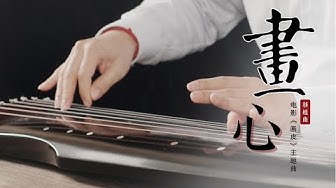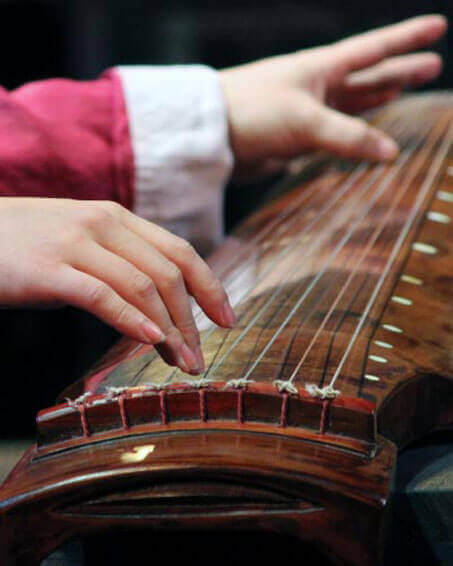【古琴Guqin】“画出你的模样!”钟老师版本的《画心》上线啦!(From “Painted Skin”)
电影《画皮》主题曲
Theme Song of “Painted Skin”
作曲:藤原玉郎
Composed by IKURO FUJIWARA
移植、订指法:钟之岳
Adapted by Zhong Zhiyue
演奏:钟之岳
Guqin solo:Zhong Zhiyue
联合出品:龢樂斋、今日古琴
Present by He Yue Zhai & Guqin China
Explore Traditional Chinese Music at Singapore's He Yue Zhai Music and Arts Centre
He Yue Zhai music and arts centre and chinese arts school that focuses on promoting Guqin history and culture. We actively champion the appreciation of Traditional Guqin music and collaborate with world-renowned arts and cultural organisations to develop a growing love for Guqin in the country.
Our classes are open to learners of all ages and levels of experience. We provide a supportive and welcoming environment where students can learn music and arts at their own pace. We also offer performance opportunities for our students where they can share their music with the community.
Continuing the Legacy of Traditional Guqin Music
At He Yue Zhai, we firmly believe in the importance of Chinese traditional music. Our classes are designed to teach students the history and techniques behind this unique form of music instrument.
Our teachers are all experienced Guqin players who have dedicated themselves in mastering this art form. By learning Chinese traditional music, you will not only gain a deeper understanding of this Chinese culture but also develop new skills and talents. So come join us at He Yue Zhai and discover the delights of Chinese guqin music!
The Four Arts of the Chinese Scholar
The four arts of the Chinese scholar represent the pinnacle of Chinese culture and wisdom. They are Qín (Guqin), Qí (Chess, or Go as commonly known now), Shū (Calligraphy) and Huà (Chinese painting).
These four arts of the Chinese scholar are an important part of Chinese culture and tradition and have been practised for centuries, and they formed a fundamental part of Chinese education and culture. They teach students discipline, creativity, and critical thinking skills.
Qin
Qín (琴) is the musical instrument commonly known as Guqin - a seven-stringed zither which has been around for more than 3,000 years. During the Imperial Chinese period, scholars were expected to play guqin as an art-form.
Qin is often used to accompany poetry readings, and is considered to be the most poetic of all the Chinese instruments.
Qi
Qí (棋) is an ancient board game which the Chinese refer to as Weiqi, or Go. It is a strategy board game that has been played in China for centuries. It is a game of patience and discipline and can be used to teach strategic thinking skills.
Today, Weiqi is still prevalent in China and is considered to be one of the Four Arts of the Chinese Scholar.
Shu
Shū (書) is the Chinese term for calligraphy, which has been practised since the inception of written Chinese characters. Chinese calligraphy is a means of preserving the thoughts and teachings of scholars for immortality and is seen as a valuable item of ancient China.
Calligraphy is an art that combines strength, grace and beauty into one. It is believed to be the highest form of writing because of its complexity and attention to detail. With sufficient practice, you can become proficient in writing characters, using the proper brushstrokes and angles to create harmony.
Hua
Huà (畫) is Chinese painting, a type of brush painting which is the ultimate art form for a scholar to learn. A Chinese noble would demonstrate mastery over the art of line and often paintings would be made on rice paper or silk, using just black ink and one brush.
Chinese painting, which can be traced back to Neolithic pottery, was valued for intentional and calculated strokes, as well as its ability to record imagination vividly. Guo Hua painting is the name given to works that involve these traditional materials and subjects.
Understanding the Cultural Significance of the Four Arts
As you explore the four arts of the Chinese scholar, it is important to understand their cultural significance. The four arts are a reflection of an ancient Chinese idea of living a harmonious and balanced life. The four arts emphasise the importance of learning, self-improvement, and personal fulfilment.
By learning and mastering these traditional arts, we can gain greater insight into our own personal development as well as the greater cultural significance of these skills and practices.
Discover a New World of Arts and Music
He Yue Zhai Music and Arts Centre is dedicated to helping you explore the ancient art of Tea ceremony, Tea appreciation, Xiao lessons, and Guqin lessons. Our aim is to help everyone gain a deeper understanding and appreciation of these traditional Chinese arts.
1. Tea Ceremony
Explore Chinese tea culture's rich history and customs with our tea ceremony classes. Our classes cover the art of making and serving tea, as well as the etiquette of tea ceremonies.
2. Tea Appreciation
Learn how to appreciate the taste and aroma of great-tasting teas, and develop an appreciation for the subtle nuances of tea from different regions.
3. Xiao Lessons
Learn the basics of playing the Chinese xiao flute, including how to read musical notes, and how to play these notes on the flute.
4. Guqin Lessons
Learn the basics of the Guqin, an ancient Chinese seven-stringed plucked instrument. Our lessons will take you through the basics of playing the guqin, and how to read Guqin music score.

Any Enquiries? Feel free to Message Us!
Send us your message and our team will get back to you as soon as possible.
CONTACT US NOWJoin our mailing list to get updated with our latest News & Events!






